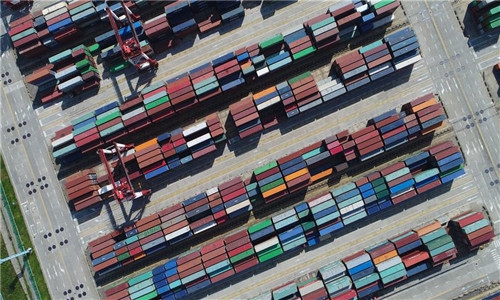
Photo taken on Sept. 30, 2020 shows the street view of the Lujiazui area of Pudong, east China's Shanghai. (Xinhua/Wang Xiang)
Shanghai aims to develop the Lujiazui Finance and Trade Zone into a global financial asset allocation center for the yuan, the Chinese currency, and a world-class financial hub, according to the newly released 14th Five-Year Plan for the development of Lujiazui on Thursday.
By 2025, the cumulative number of financial institutions covering different businesses is expected to exceed 10,000 and the number of licensed financial institutions will reach more than 1,000, said the plan.
Moreover, the number of regional headquarters of multinational companies located in Lujiazui will be doubled to 200, accounting for 20 percent of the total number in Shanghai and aiming to attract more global companies to settle their regional headquarters in Lujiazui.
In 2020, the total economic volume of Lujiazui exceeded 500 billion yuan ($77.2 billion), of which the added value of the financial industry reached 358.5 billion yuan, an increase of 123.2 percent from the end of the 12th Five-Year Plan period, local news site jfdaily.com reported on Thursday.
At the end of 2020, Lujiazui was host to 12 national markets and financial infrastructures, with more than 6,000 Chinese and foreign financial institutions settled in the financial zone.
As China's first financial and trade zone and the most important financial cluster in Shanghai, Lujiazui will further strengthen its three major advantages and functional positioning in order to achieve the development goals laid out within the 14th Five-Year Plan, as Lujiazui has the highest level of internationalization, the most complete corporate structure and the best business services.
Also, Lujiazui will strengthen the core functions of key industries such as the financial industry and professional service industry while deepening cooperation with international organizations and institutions, local media reported.
Global Times



